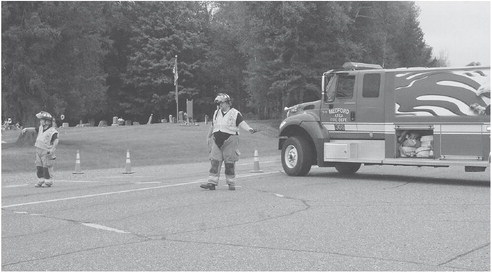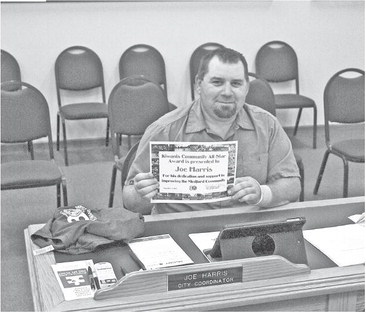Curtiss presents sewer options to Abbyland
Curtiss officials have presented Abbyland Foods with three options for upgrading the village’s sewage treatment facilities, with two of the options allowing the company to significantly expand its future output.
The village board last Thursday approved a one-page letter to the company describing the potential upgrades to the treatment plant, which currently consists of five lagoons.
“We’ve definitely come out with some very good options,” said trustee Jon Unruh.
Each of the three options would involve the installation of upgraded aerators, additional filters and a membrane reactor to remove higher levels of phosphorus and ammonia. The village would also install wells and pumping pits to remove groundwater from the area around the lagoons.
For the most basic upgrade, the cost would be $3.1 million, with an estimated pricetag between $1.1 million and $2.6 million after grants are factored in. This assumes no additional inflow from Abbyland and moderate population growth over 20 years.
For option 2, the pre-grant price would increase to $4.2 million for larger-sized facilities that would be able to handle increased flow and BODs (high-strength waste) from Abbyland’s pork processing plant.
The most expensive option, at $5.7 million, would allow the company to pump a maximum of 1.2 million gallons of waste to the plant every week, along with over 45,000 pounds of BOD waste.
Unruh said the first option would be the only one where the village and Abbyland share the cost of the upgrades.
“They would potentially be paying for 100 percent of the upgrades above option one, because it would solely be for them,” he said.
In the letter, village officials apologized for previously sending the company a $20.6 million upgrade proposal, saying “it was not what any of us were expecting” from engineering firm MSA Professional Services.
The latest options are based on proposals presented to the village by another engineering firm, CBS Squared, which provided a “second opinion” after Curtiss officials rejected MSA’s initial proposal.
One of the biggest cost savings comes from not having to raise the bottoms of the sewer lagoons in order to provide greater separation from the groundwater underneath. Instead, the village plans on “de-watering” the area with pumps to prevent any possible contamination.
“Basically, we would monitor the groundwater level, and if we find it is too high, we would put in pumping pits to pump out the water and lower the groundwater table,” Unruh said.
The board voted to send this groundwater plan to the Wisconsin DNR and see what the agency says in response.
Swarr noted that the aerators in the upgraded plant would be much more effi cient than the current ones, so there should be some cost savings on the operational end. “We haven’t totally nailed down a number, but it appears that we could quite easily have anywhere from a 25 to 50 percent reduction in power consumption, which would be huge,” he said.
Now that Abbyland has options presented by the village, the board expects to hear from the company within a month.
“Once they decide on an option, then basically you can start preliminary design and simultaneously get your facility plan going because you have to file that (with the DNR),” Swarr said.
The board tabled a work agreement with CBS Squared, with Unruh saying he wants to make sure that Swarr and other village officials are guaranteed to have input on the project as it progresses.
“If they don’t work with us on our terms, we’ll find someone else who will,” Unruh said.
Trustee Jon Unruh said he and DPW Larry Swarr feel like the village has been undercharging commercial properties on their sewer bills. Right now, each commercial property with a 1.5 inch water meter is charged as if it was the equivalent of 2.5 single-family residences.
“The average of those meters is probably eight times the flow of a residential meter, so we’re thinking that should be adjusted,” Unruh said.
Some of the commercial properties being charged 2.5 times a residential equivalent include the trailer home court, El Norteno restaurant and the Abbyland Truck Stop, which produces 10 times the flow of an average household.
If the meter charge is not increased for commercial properties, Unruh said everyone else’s meter charges would go up to make up the difference. Instead, he said the village is looking at charging commercial meters at a rate of five times what a residence pays, which would raise the meter rate from $75 to $160.
Unruh said the village will likely phase the increases in gradually over time.
At the same time, he said the fire hall is being overcharged for its sewer services based on the size of its water meter, three inches, which is needed to fill fire trucks.
Unruh and Swarr said sewer rates also need to be adjusted based on a flow of BOD that is most likely coming from Abbyland’s pork plant but is not being measured by the village.
“When that happens, we will have to immediately redo our rates,” Swarr said.
Recent dye tests at the pork plant showed two areas of outflow that are bypassing a flume used by the village to monitor the plant’s outgoing waste. Some additional plumbing or a second flume is needed to track this waste.
Swarr said the sewer rates should be set at a level that charges all users equitably for running the sewer utility.
The board agreed to revisit the sewer rates at its Dec. 7 meeting.
“The main thing to take away from this meeting is that we’re not going to have a big hike in the rates,” Swarr said. “There will be some extra fixed charge for commercial, but it’s because we’re making it more equitable for everyone.”
_ The board reviewed the proposed 2022 budgets for the general fund, water and sewer utilities. The general fund includes a local property tax levy of $114,419 — the same as this year.
_ Swarr told the board that he took over 100 pictures of the village’s west water tower after it was recently repainted and inspected.
“Unfortunately, it was worse than I expected,” he said, noting that he found areas of rust and other problems. He said the village should withhold payment for the work until the mistakes are fixed.
_ Board members approved a $111 subtraction from a recent MSA bill after discussing the disputed $1,600 invoice with MSA engineer Mike Voss. The deducted amount was for work done by an engineer that village officials have said they no longer want to work with.
Voss and board members talked about various ways in which MSA could make sure the village is not surprised by bill amounts when they come in for payment.
“We have to know what we’re being billed for and why we’re being billed for all that money,” said village president Betty Rettig.
_ The board voted to hire Travis Schilling as backup snow plow driver, at $20 per hour, and to advertise for a permanent plow driver/grader operator.
_ The board authorized Swarr to purchase a $1,000 fire hydrant repair kit to fix two leaking hydrants.
_ Trustees discussed a problem with vehicles driving over a ditch and manhole on New Street, possibly causing damage to the manhole. Swarr agreed to talk to those driving over the manhole and to possibly put up posts if the warnings are not heeded.



